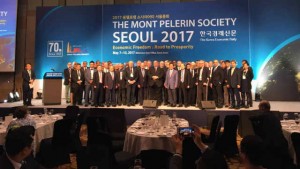Home » Commentary » Opinion » Reflections on Seoul
· Ideas@TheCentre
 I just returned from a fascinating experience in Seoul — including a Presidential election in Korea that saw a landslide victory for a socialist leaning and ‘pro-North’ candidate Moon Jae-in, and a visit to the DMZ. The reformer Moon Jae-in is a reaction against charges of corruption and cronyism.
I just returned from a fascinating experience in Seoul — including a Presidential election in Korea that saw a landslide victory for a socialist leaning and ‘pro-North’ candidate Moon Jae-in, and a visit to the DMZ. The reformer Moon Jae-in is a reaction against charges of corruption and cronyism.
Since 1953, Korea’s development is nothing short of miraculous, but obviously there are tensions in the system that must be explored. I wasn’t there long enough or studied the system in-depth enough to offer a constructive answer, but my priors would lead me to think in terms of the differences between industrialization and development.
But that might not be the right way to think about it. In my book The Collapse of Development Planning, Young Back Choi has an excellent chapter on the Korean model, and Ben Powell’s dissertation written in the early 2000s explored this difference between industrialization and development in the context of the debate concerning the Asian Tigers.
My short visit convinced me of the importance of revisiting these issues. This was, of course, nowhere as stark as in looking across the divide between North and South as well as the satellite imagery that is now well-known showing the respective countries at night. Whether real or not, I haven’t personally felt the scars of socialist-communism in visiting a country since my travels in the early transition period in East and Central Europe and the former Soviet Union.
As a comparative political economist, Korea reaffirmed my fascination with how alternative political, legal, social and cultural institutions impact the economics and financial practices of a nation. As a human being, I was reminded of the horrors of war and the tragedy of political oppression.
The Mont Pelerin Society Regional Meetings themselves were fantastic in content and organization. It was a jam packed program put together by the organizing committee of Kyu-Jae Jeong (Co-chair), Tae-shin Kwon (Co-chair), Inchul Kim (Co-chair), Hong Yeol Kim, and Youngsul Kwon (Secretary General), and it included talks by local scholars on the Korean economy, but also international scholars on the general problems that liberalism must face.
A highlight for me — as an economist — was the panel featuring Lars Hansen, Vernon Smith and Israel Kirzner. The organizing committee and the program committee put together a first-rate intellectual experience and despite the political situation with heightened tensions in the region the conference had a great attendance with rooms full to capacity to hear the speakers.
MPS was founded to cultivate a constructive conversation about liberalism, and its continuing relevance for the practical problems of the day. As I said in my opening speech — the Walter Lippmann Colloquium — from which Mont Pelerin Society (MPS) derives — was concerned with the challenges to classical liberalism that the (real or imagined) inefficiency, instability and inequality of the market represented.
This is still our challenge today. And meeting it requires a reconstruction of the liberal project for our time. But in that reconstruction there are also time honoured principles that must be adhered to I would argue. Reconstruction is not abandonment.
Peter Boettke is an American economist of the Austrian School. He is currently a University Professor of Economics and Philosophy at George Mason University; the BB&T Professor for the Study of Capitalism, Vice President for Research, and Director of the F.A. Hayek Program for Advanced Study in Philosophy, Politics, and Economics at the Mercatus Center at GMU. He is President of the Mont Pelerin Society.
Reflections on Seoul